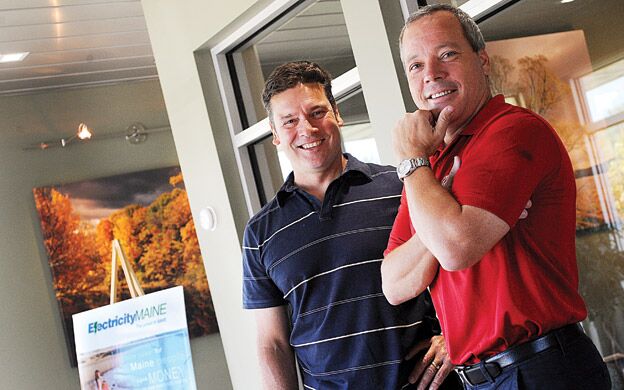Electricity Maine finds 150K customers in a growing market
At first, it was an easy sell. In a time of rising energy costs, central Maine businessmen Kevin Dean and Emile Clavet wanted to provide cheaper electricity to people and businesses in Maine.
But the owners of Auburn-based Electricity Maine found that when you make headlines for offering rates 17% lower than the competition, consumer disbelief tends to set in.
"We have some people who will walk in because they want to kick the bricks and see that we're actually here," says Clavet, who, combined with Dean, has run some 20 companies.
Once that disbelief started to fade, Electricity Maine grew quickly. Now 14 months old, the company projects first-year revenues of $100 million and a 25% market share among residential customers.
"We think we can double that again in the next year or so," says Dean, whose customer base already exceeds 150,000. "We are probably one of the fastest-ever growing businesses in the state of Maine."
As a competitive energy supplier, Dean and Clavet join about 30 other power suppliers offering service to small-scale consumers to power residences and small businesses. The niche of energy suppliers widened more than 10 years ago when utility statutes changed, opening a market that had been dominated by Central Maine Power Co. and Bangor Hydro. What sets Electricity Maine apart from other power suppliers is its use of billing software developed for another Dean/Clavet venture, a medical billing and financing company founded in 1995 called Provider Financial LLC.
"Many of the new [power supply] players aren't able to handle the thousands and thousands of transactions," says Dean. "We have a software system developed for our medical billing company that submits millions of claims through the system, so part of our background is in how to manage that."
The pair taps other expertise drawn from past ventures, including financial management experience and forecasting software that comes in handy when predicting volatile energy prices and consumer demand.
"We have to be able to forecast that day and night for the future year in order to buy efficiently what we think you are going to use," Dean says.
"[Electricity] is not dissimilar to selling many other things, but it is a very complex thing to finance and manage from a risk perspective," says Clavet. "If you are going to buy electricity for a year and offer it to someone for their home, you need to hedge yourself against the risk of that cost going up."
At one point this year, that forecasting model and other market conditions allowed the company to offer electricity at a rate 17% lower than CMP's standard offer for some customers, briefly boosting enrollment to 2,000 to 3,000 new customers each day, according to Dean.
"We don't have the same overhead, and we're willing to work for less of a margin and try to compete that way," says Dean.
The company's price now holds around 5% lower than CMP's and 1.5% lower than Bangor Hydro, according to the Maine Public Utilities Commission.
"The average homeowner is going to save $5 a month. Last year, it was probably $10 to $15 depending on when they signed up with us," says Dean. "There is not a zip code in CMP or Bangor Hydro territory where we don't have a business or a resident signed up."
Clavet adds, "It's not the idea that the savings are huge, but they are consistent and it's for as long as you stay."
Entering the market
As part of the state's restructuring of electricity markets in 2000, power utilities had to choose whether to supply or deliver electricity — they could no longer do both. CMP and Bangor Hydro both went the delivery route, opening up the market to smaller suppliers to provide the actual juice flowing through the lines.
For consumers less motivated to shop around for a cheaper source of electricity, the PUC stepped in to arbitrate a standard offer by soliciting bids from suppliers. The standard offer process is undertaken once a year for residential and small commercial customers, and monthly for medium and large commercial and industrial consumers, according to the PUC.
The rising popularity of Electricity Maine can be accounted for in part by the difference in the purchasing cycle between Electricity Maine and standard offer providers, says Dick Davies, the state's Public Advocate. Because Electricity Maine continually hunts for best prices from power generators, it can respond quickly and deliver discounts to customers. Electricity for the standard offer is bought piecemeal, with the PUC soliciting three-year contracts for one-third of the required supply once a year.
"The advantage is that prices have been coming down and while the PUC is getting one-third of that decline, Electricity Maine has been able to capture about 100% of that," says Davies.
While the practice has been a boon to Electricity Maine so far, it also makes the company more vulnerable to fluctuations in the energy market, says Davies.
"The fact that the PUC bids out a third of the demand moderates an increase in the standard offer, but Electricity Maine might find their prices going up faster than the standard offer so the benefit might be eroded," he says.
Marketing the message
Over the last decade, many medium and large customers have migrated to the open market, with 84% of CMP's large-business customers choosing competitive energy suppliers over the standard offer. But residential customers had been slow to follow at only .05%, a reflection of fewer choices for suppliers interested in small business and residential customers. According to the PUC, there are 100 companies in the state approved to sell to large commercial and industrial customers, but only 34 companies supplying residential consumers in the CMP coverage area.
"There had been no focus on the small customer and small business accounts over the last decade," says Dean.
That was their market opportunity. With infrastructure in place to process accounts and the finances to enroll a couple thousand customers, Dean and Clavet began to spread their "factory direct pricing" message.
They used social media, town hall meetings and workplace breakrooms to engage potential customers. They touted ease-of-switching and offered two contract options, "we're the first guy out there to offer that choice," says Dean.
For residential consumers, Electricity Maine offers two packages: Prime Savings is a year-long contract locking customers into the lowest possible rate at the time; Basic Savings is a higher month-to-month rate for customers considering a switch from their current service, or for those enrolled in Prime Savings who fail to pay their bill on time.
At press time, the Prime Savings rate was 7.07 cents/kWh, compared with CMP and Bangor Hydro's standard offers of 7.4 and 7.1 cents/kWh, respectively.
"Everyone who has joined has seen a decrease in their electricity bills to some degree," says Davies, the Public Advocate. "We're delighted to see a competitive energy provider come along for [residential] customers. Because what they pay is relatively small, the cost of acquiring those customers ends up being large, but Electricity Maine has found a way to attract a lot of customers and the cost to acquire has been relatively low," he says.
Ninety percent of Electricity Maine's customers are residential, while about 6,000 small and medium businesses make up the other 10%, according to Dean. The service is particularly attractive to medium-sized businesses that would otherwise have to buy into a standard offer rate that fluctuates from month-to-month, according to Dean.
"Our rates are fixed, so [in the winter] when you're trying to heat your business, you're not also paying the highest rate for power," says Dean.
The model can also work on a municipal level, according to Dean, who says the town of Dover-Foxcroft has switched to Electricity Maine to power its streetlights.
The early success of Electricity Maine has already sparked interest from other potential competitive energy suppliers, says Davies."We've heard about marketing calls from companies making [similar] options; it would be interesting to have increased competition."
In the meantime, Electricity Maine is taking its model out of state. The company recently expanded as New Hampshire Electricity, netting 10,000 customers in the Granite State. Dean says New Hampshire is the first expansion outside of Maine, though paperwork has been filed in others.
"There are 13 states we can do it in [and] ideally we would able to offer services in the Maine Public Service [Co.] territories, another 37,000 meters," he says. "But there is plenty of business in Maine and plenty of people still on the fence. It's easy to say we have home field advantage. Ideally, we will locate a call center here. There might be support staff in individual states, but this is our business home."
Read more
Electricity Maine to be bought by Houston energy firm for $28M












Comments